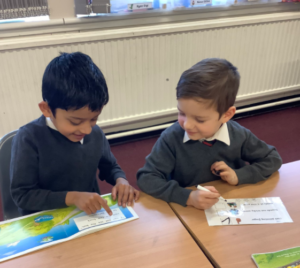Language and literacy are of personal, social and economic importance. Through language, children and young people can gain access to the literary heritage of humanity and develop their appreciation of the richness and breadth of Scotland’s literary heritage. Children and young people encounter, enjoy and learn from the diversity of language used in their homes, their communities, by the media and by their peers.
Literacy is fundamental to all areas of learning at St. Stephen’s as it unlocks access to the wider curriculum. Being literate increases opportunities for the individual in all aspects of life, lays the foundations for lifelong learning and work, and contributes strongly to the development of all four capacities of Curriculum for Excellence.
The Literacy and English framework promotes the development of critical and creative thinking as well as competence in listening and talking, reading, writing and the personal, interpersonal and team-working skills which are so important in life and in the world of work. The framework provides, for learners, parents and teachers, broad descriptions of the range of learning opportunities which will contribute to the development of literacy, including critical literacy, creativity, and knowledge and appreciation of literature and culture.
The three organisers within the literacy and English framework are:
· listening and talking
· reading
· writing.
At St. Stephen’s pupils experience an environment which is rich in language and which sets high expectations for literacy and the use of language. Children and young people spend time with stories, literature and other texts which will enrich their learning, develop their language skills and enable them to find enjoyment.
Our staff skilfully implement a mix of appropriate approaches following North Lanarkshire Council’s Active Literacy Programme.
These include:
· the use of relevant, real-life and enjoyable contexts which build upon children and young people’s own experiences
· effective direct and interactive teaching
· a balance of spontaneous play and planned activities
· harnessing the motivational benefits of following children and young people is interests through responsive planning
· collaborative working and independent thinking and learning
· making meaningful links for learners across different curriculum areas
· building on the principles of Assessment is for Learning
· frequent opportunities to communicate in a wide range of contexts, for relevant purposes and for real audiences within and beyond places of learning
· the development of problem-solving skills and approaches
· the appropriate and effective use of ICT.
The balance between these approaches will vary at different stages and across different sectors and areas of the curriculum. Continuing dialogue about learning and teaching approaches within and across sectors will help to ensure continuity and progression.
At St. Stephen’s we promote the development of skills in using language, particularly those that are used regularly by everyone in their everyday lives. These include the ability to apply knowledge about language. They reflect the need for young people to be able to communicate effectively both face-to-face and in writing through an increasing range of media. They recognise the importance of listening and talking and of effective collaborative working in the development of thinking and in learning.
In particular, the experiences and outcomes address the important skills of critical literacy. Children and young people not only need to be able to read for information: they also need to be able to work out what trust they should place on the information and to identify when and how people are aiming to persuade or influence them.
In addition to the opportunities to develop literacy in all aspects of learning, there are strong connections between learning in English and learning in other areas of the curriculum at St. Stephen’s. There are close links, for example, between the expressive arts and creative writing, and social studies and critical literacy. Interdisciplinary studies are likely to involve both research and a strong element of presentation and provide valuable opportunities to extend language skills. In numeracy, information handling outcomes link clearly to the critical literacy outcomes where learners are asked to assess the reliability of information.
Our pupils will be:
· engaged in talking together to deepen their learning and thinking
· working together to prepare for reading unfamiliar texts
· reading a wide range of texts to gather and analyse information for a range of purposes
· writing clear explanations
· communicating information or opinions.


